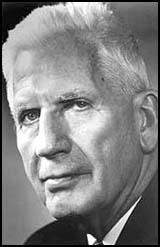Paul H. Douglas

Paul Douglas was born in Salem, Massachusetts, on 26th March, 1892. He came from a poor family and was forced to work his way through Bowdoin College. He then secured a master's degree at Columbia University and did postgraduate work at Harvard University.
Douglas taught economics at the University of Illinois, the University of Washington and the University of Chicago. In 1927 Douglas visited the Soviet Union. However, he disliked the political system he saw and rejected Marxist economic theory. Douglas also published several books on economics. This included Wages and the Family (1925), Real Wages in the United States, 1890-1926 (1930) and Standards of Unemployment Insurance (1933).
A supporter of the Democratic Party, Douglas admired Franklin D. Roosevelt and his New Deal policies. He became friendly with Harold L. Ickes (Interior Secretary) and Frances Perkins (Labor Security) and in 1933 was appointed to the Consumers' Advisory Board of the National Recovery Administration. He also helped with drafting the Social Security Act and the National Labor Relations Act.
Douglas continue to write books on economics. His work included Theory of Wages (1934), Controlling Depressions (1935), and Social Security in the United States (1936). He was a member of the national committee of the Farmer-Labor Political Federation, and was treasurer for the American Commonwealth Political Federation. In 1939 he was elected to the Chicago City Council as an Independent Democrat.
Douglas was a Quaker and opposed the use of military action to solve political disputes. However, his views changed when Benito Mussolini ordered the invasion of Ethiopia. The Spanish Civil War and the betrayal of Czechoslovakia at Munich convinced Douglas that the Neutrality Acts only benefited aggressor nations. In a debate with the pacifist Norman Thomas, he argued: "Personal pacifism is impossible for any nation to follow."
During the Second World War Douglas, despite being 49 years old, he joined the Marine Corps as a private. He was badly wounded at Okinawa and was awarded the Bronze Star. When he was discharged in 1946, Douglas had reached the rank lieutenant colonel. Despite five operations on his injured left arm, its full use was never restored.
In 1948 Douglas was elected to the Senate. A strong opponent of communism, Douglas supported the Marshall Plan, the Truman Doctrine, and the North Atlantic Treaty Organization. He was also in favour of United States military action in Korea. He was a passionate liberal concerning domestic policy and welcomed the attempts by Harry S. Truman to introduce the Fair Deal.
Douglas was also a forceful champion of civil rights, social welfare programs, public housing, extension of Social Security, Medicare, and federal aid to education and legislation beneficial to trade unions. He also attempted to expose corruption in Congress. He was especially concerned about the power of a group of Texas politicians being funded by the oil industry.
After losing his seat in 1966 Douglas published his autobiography, In the Fullness of Time: The Memoirs of Paul H. Douglas (1972).
Paul H. Douglas died in Washington on 24th September, 1976. He was cremated and his ashes were scattered in the wooded area in Jackson Park, Chicago.

